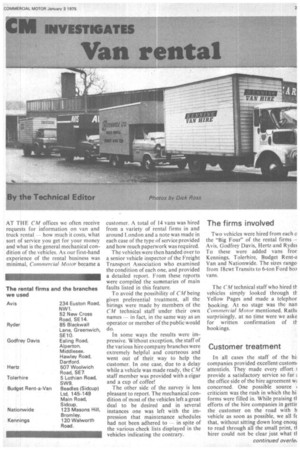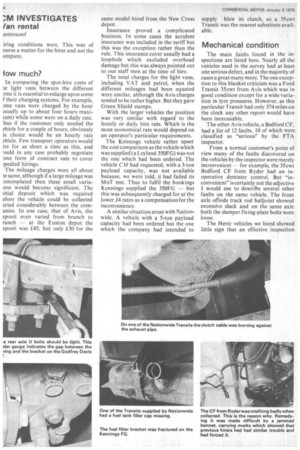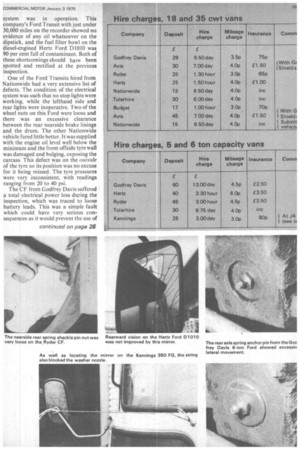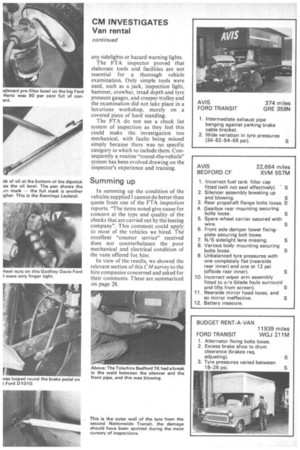AT THE CM offices we often receive requests for information
Page 25

Page 26

Page 27

Page 28

If you've noticed an error in this article please click here to report it so we can fix it.
on van and truck rental how much it costs, what sort of service you get for your money and what is the general mechanical condition of the vehicles. As our first-hand experience of the rental business was minimal, Commercial Motor became a customer. A total of 14 vans was hired from a variety of rental firms in and around I .ondon and a note was made in each case of the type of service provided and how much paperwork was required.
The vehicles were then handed over to a senior vehicle inspector of the Freight Transport Association who examined the condition of each one, and provided a detailed report. From these reports were compiled the summaries of main faults listed in this feature.
To avoid the possibility of CM being given preferential treatment, all the hirings were made by members of the CM technical staff under their own names — in fact, in the same way as an operator or member of the public would do.
In some ways the results were impressive. Without exception, the staff of the various hire company branches were extremely helpful and courteous and went out of their way to help the customer. In one case, due to a delay while a vehicle was made ready, the CM staff member was provided with a cigar and a cup of coffee!
The other side of the survey is less pleasant to report. The mechanical condition of most of the vehicles left a great deal to be desired and in several instances one was left with the impression that maintenance schedules had not been adhered to in spite of the various check lists displayed in the vehicles indicating the contrary.
The firms involved
Two vehicles were hired from each o the "Big Four" of the rental firms Avis, Godfrey Davis, Hertz and Rydei To these were added vans fror Kennings, Tolerhire, Budget Rent-a Van and Nationwide. The sizes range, from l8cwt Transits to 6-ton Ford bo) vans.
The CM technical staff who hired th vehicles simply looked through th Yellow Pages and made a telephor booking. At no stage was the nan COMMert ial Motor mentioned. Rath( surprisingly, at no time were we aske for written confirmation of th bookings.
Customer treatment
In all cases the staff of the hii companies provided excellent custom' attentidn. They made every effort 1 provide a satisfactory service so far ; the office side of the hire agreement wi concerned. One possible source criticism was the rush in which the hi forms were filled in. While praising tl efforts of the hire companies in gettir the customer on the road with h vehicle as soon as possible, we all ft that, without sitting down long enoui to read through all the small print, ti hirer could not be clear just what tl iring conditions were. This was of ourse a matter for the hirer and not the om pa ny.
low much?
In comparing the spot-hire costs of le light vans between the different rms it is essential to enlarge upon some f their charging systems. For example, 3me vans were charged by the hour isually up to about four hours maxiturn) while some were on a daily rate. hus if the customer only needed the chicle for a couple of hours, obviously is choice would be an hourly rate chicle. Few transport operators would ire for as short a time as this, and 'ould in any case probably negotiate )me form of contract rate to cover !.pealed hirings.
The Mileage charges were all about le same, although if a large mileage was 3nternplated then these small variaons would become significant. The iitial deposit which was required efore the vehicle could be collected tried considerably between the cornanies. In one case, that of Avis, the eposit even varied from branch to ranch — at the Euston depot the eposit was £45, but only £30 for the same model hired from the New Cross depot.
Insurance proved a complicated business. In some cases the accident insurance was included in the tariff but this was the exception rather than the rule. This insurance cover usually had a loophole which excluded overhead damage but this was always pointed out to our staff men at the time of hire.
The total charges for the light vans, including VAT and petrol, when the different mileages had been equated were similar, although the Avis charges tended to be rather higher. But they gave Green Shield stamps.
With the larger vehicles the position was very similar with regard to the hourly or daily hire rate. Which is the most economical rate would depend on an operator's particular requirements.
The Kennings vehicle rather upset the cost comparison as the vehicle which was supplied (a I,eyland 350FG) was not the one which had been ordered. The vehicle CM had requested, with a 3-ton payload capacity, was not available because, we were told, it had failed its MoT test. Thus to fulfil the bookings Kennings supplied the 350FG — but this was subsequently charged for at the lower J4 rates as a compensation for the inconvenience.
A similar situation arose with Nationwide. A vehicle with a 5-ton payload capacity had been ordered but the one which the company had intended to supply blew its clutch, so a 35cwt Transit was the nearest substitute available.
Mechanical condition
The main faults found in the inspections are listed here. Nearly all the vehicles used in the survey had at least one serious defect, and in the majority of cases a great many more. The one exception to this blanket criticism was a Ford Transit 35cwt from Avis which was in good condition except for a wide variation in tyre pressures. However, as this particular Transit had only 374 miles on the clock any other report would have been inexcusable.
The other Avis vehicle, a Bedford CF, had a list of 12 faults, 10 of which were classified as "serious" by the FTA inspector.
From a normal customer's point of view many of the faults discovered on the vehicles by the inspector were merely inconvenient — for example, the 35cwt Bedford CF from Ryder had an inoperative demister control. But "inconvenient" is certainly not the adjective I would use to describe several other faults on the same vehicle. The front axle offside track rod balljoint showed excessive slack and on the same axle both the damper fixing-plate bolts were loose.
The Hertz vehicles we hired showed little sign that an effective inspection system was in operation. This company's Ford Transit with just under 30,000 miles on the recorder showed no evidence of any oil whatsoever on the dipstick, and the fuel filter bowl on the diesel-engined Hertz Ford D1010 was 90 per cent full of contaminant. Both of these shortcomings should have been spotted and rectified at the previous inspection.
One of the Ford Transits hired from Nationwide had a very extensive list of defects. The condition of the electrical system was such that no stop lights were working, while the lefthand side and rear lights were inoperative. Two of the wheel nuts on this Ford were loose and there was an excessive clearance between the rear nearside brake linings and the drum. The other Nationwide vehicle fared little better it was supplied with the engine oil level well below the minimum and the front offside tyre wall was damaged and bulging, exposing the carcass. This defect was on the outside of the tyre so its position was no excuse for it being missed. The tyre pressures were very inconsistent, with readings ranging from 20 to 40 psi.
The CF from Godfrey Davis suffered a total electrical power loss during the inspection, which was traced to loose battery leads. This was a simple fault which could have very serious consequences as it would prevent the use of any sidelights or hazard warning lights.
The FTA inspector proved that elaborate tools and facilities are not essential for a thorough vehicle examination. Only simple tools were used, such as a jack, inspection light, hammer, crowbar, tread depth and tyre pressure gauges, and creeper trolley and the examination did not take place in a luxurious workshop, merely on a covered piece of hard standing.
The FTA do not use a check list system of inspection as they feel this could make the investigation too mechanical, with faults being missed simply because there was no specific category in which to include them. Consequently a routine "round-the-vehicle" system has been evolved drawing on the inspector's experience and training.
Summing up
In summing up the condition of the vehicles supplied I cannot do better than quote from one of the FTA inspection reports. "The items noted give cause for concern at the type and quality of the checks that are carried out by the leasing company". This comment could apply to most of the vehicles we hired. The excellent "counter service" received does not counterbalance the poor mechanical and electrical condition of the vans offered for, hire.
In view of the results, we showed the relevant section of this CM survey to the hire companies concerned and asked for their comments. These are summarized on page 28.












































































